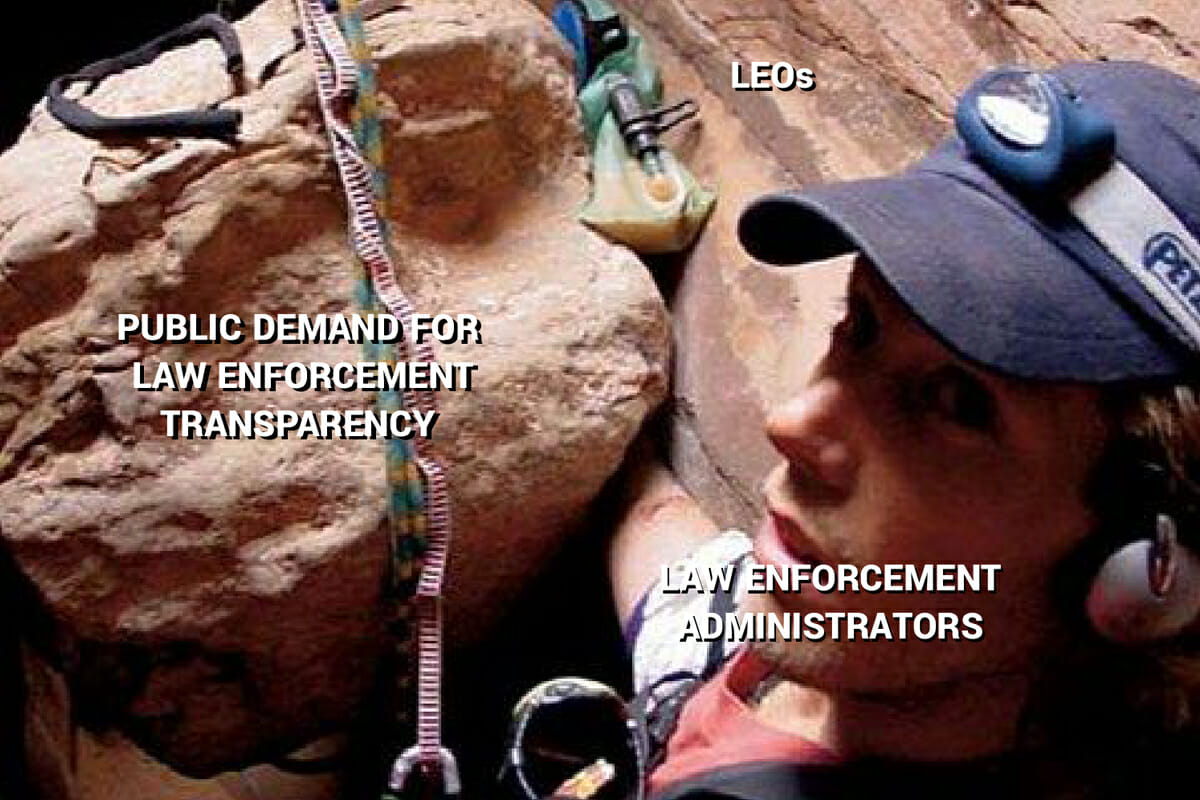How do I balance the public’s demand for transparency with my personnel’s frustration at change?

In 2003, an avid outdoorsman named Aron Ralston went for a hike just outside the Canyonlands National Park here in Utah. While adventuring in a deep cut, an 800 lb. rock fell and pinned Aron’s arm between the rock and the canyon wall. Despite efforts to free himself, Ralston was literally stuck between a rock and a hard place for five days until he cut off his own arm with a dull pocketknife to escape.
Especially these days, you spend your time maintaining the delicate balancing act between the “rock” of the public who demand transparency and the “hard place” of your staff who can think you’re throwing them under the bus. When you signed on as an administrator, you probably had bright ideas of how you could better the department, but reality says you spend more time playing politician than work on change for your agency.
Some days, “cutting off your arm with a dull pocketknife” and retiring early doesn’t seem so bad. Some days, it’d be worth it to take the hit on your pension just to be done.
Government in Action!
In today’s technological day and age, the public has a front row seat to the “Greatest Show on Earth”. Well, 5-10 minute clips of it anyway. And it’s from that from that very limited information that “experts” have decided that American Law Enforcement is out of control. They see a few high-profile instances of questionable conduct and condemn all Law Enforcement before all of the facts are out. Failing to recognize that responsible investigation of such incidents takes time, people in today’s “I want it now!” culture have locked in their opinion before Law Enforcement can say much. They demand action from their government, and their government wants to keep their jobs.
True to form, many of our wise elected officials have decided that requiring more bean counting from agencies is the only way to get the facts about what is really happening out on the streets. Long story short, we all know that shit runs downhill, and your Patrol and Clerical Personnel now get the privilege of spending less time doing what they love, and more time doing paperwork. I don’t care what End of Watch says, paperwork might be the lifeblood of the department, but it still sucks.
The Benefit of Perspective
As much as I love to complain about change (I come by it honestly), you and I both know that nothing is ever as bad as the patrol team thinks it is going to be. Additionally, you have wisdom that only comes from time on the job and the perspective to see that progress in Law Enforcement does not happen without the public’s support. You understand that the overwhelming majority of your public actually does support you and your agency in your efforts to improve their community and keep them safe.
You also understand how that trust is established and maintained; by professionally serving them and keeping them well informed. But I know that there are plenty of people on your team who don’t get that. At some point, I’m sure you’ve asked yourself like we all have, “How can I help my team understand that it’s in their best interest to collect this information?”
How bad is the impact?
So, let’s be real for a second about these reporting mandates. As much as Law Enforcement hates change, its used to stuff like this. Policing is changing all the time through case law and other rule changes. It sucks, especially when you relied on a particular tactic as part of your tool kit, but does that mean that you’re down and out? Of course not. You find another way.
These mandates are really no different, and speaking frankly, they’re not going away. The best thing for Law Enforcement can do is to, “Improvise, Adapt and Overcome” as the Marine’s would say. It’s time to see this situation for what it really is, an opportunity to improve in some crucial areas.
Silver Lining
There are lots of ways in which these mandates will benefit Law Enforcement. One of the more well known is that of having accurate figures by which to defend the good that your LEOs do every day. The overwhelming majority of Cops show up to work every day and serve their communities with honor, dignity and respect, no matter who they’re dealing with. We’ve known that since Paul Harvey’s 1970’s broadcast called “Policeman” (it’s on YouTube if you haven’t heard it and it’s great). Having the real stats at your disposal as an Agency Head will help you advocate for your team. You know they do the right thing day in and day out, and now you’ll be able to provide your citizens with the data that proves it.
But there’s another benefit to these mandates that most people haven’t thought of; the opportunity to collect data. To understand why this is the wave of the future, let’s look at the past.
I’m not sure when, who or even which agency they worked for, but once upon a time, some wise old beat cop had an epiphany, “We should start writing down who we stop and talk to,” and thus the FI Card was born. They understood that you’ll solve more crime by keeping your “thumb on the pulse” and saw an opportunity to connect their department’s efforts together in that regard. Verbal pass down is great, but you forget stuff, and what you do share rarely makes it past shift change. They created a system, utilizing the best technology available to them, by which their entire agency could see what was going on. Seemingly pointless contacts all of sudden became potential suspects and witnesses. In other words, they put the data they were otherwise discarding to work for them.
I’m sure that when agencies began adopting the FI card, there were plenty who failed to catch the vision, moaning and groaning about the change. Wise administrators saw through the complaints to the benefits. They were modernizing their agencies and making meaningful progress.
Practical Application
So, here we are in the 21st century, staring down the barrel of a government mandated FI Cards revamp. We have the same opportunity our forefathers did, where we can continue to collect the data, or we can put it to work. It’s time to utilize today’s technological advancements to improve on the FI Card system. But there is a major problem standing in the way; whether due to reductions in workforce (no time), lack of useable tools, ignorance or other reasons, many departments fail to reliably enter data into their systems.
Modern software systems are INCREDIBLE. Through tools like AI and Machine Learning, we are able to process big data, see trends and draw conclusions like never before. The potential for Law Enforcement is tremendous. We’re better connected than we ever have been. You have more information available to you than any other era in the history of Policing. But these tools need to be fed. If you don’t put in the data, you won’t get the analysis.
EFORCE® Software has built and is continuing to develop technology to do just that. Our Officer Actions tools is user friendly and purpose-built for patrol. By building these requirements directly into activities that your team are already doing, like Incident Reports, Citations and FI-Cards, we streamline the work, and keep them on the street.
As we design and build the future of this technology, we’re focused on putting that data to work for your agency, just like we’ve been doing for two decades with the rest of our cutting-edge software suite. Contact us today and schedule a no-commitment look at how our tools can help you accomplish your goals of improving your agency and community.




